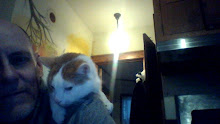A New Dream Song Newly Discovered
A DISCOVERED NEITHER FIT FOR DREAM NOR SONG for J.B. who killed himself jumping off a bridge in Minneapolis, MN
He seemed plastered, swell - ever the person well worth listening to: his slow bronchial tenor rolling in like fog. He
puff-stopped, half-swiped his brow. Adjusted coke-bottle
frames. He
kept notes which he then lost. “Mother said …” he didn’t complete the thought.
No toothbrush near his person.
One suspects his tooth despaired. One suspects
him guilty of an
interest in swinging. Sodom! Gomorrah! His magnificent
head he
somehow tilted heavenward so as to consider invisible gusts and cool developments
in jazz. “Play chess?” “I do.” [One hic two hic.] They play on deck under blankets. “Scholar’s mate! [Three hic.] Oh, good God, how ridiculous!” [Four.]
How plaster tenor teeth despaired Eh? magnificent head somehow: Huffy
Henry hid the day huffy Henry dead.


